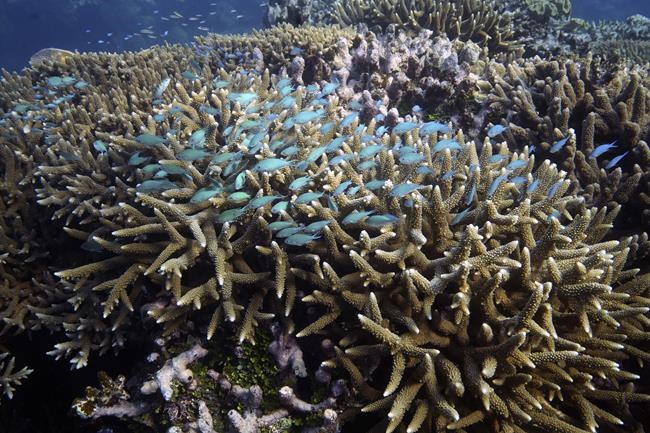United Nations members gather in New York Monday to continue efforts to forge a long-awaited and elusive deal to protect the world’s marine biodiversity.
Almost two-thirds of the ocean lies beyond national borders on the high seas, where fragmented and unevenly enforced rules try to minimize human impact.
The goal of the UN conferences, which run until March 3, is to reach a unified agreement for the conservation and sustainable use of these vast marine ecosystems. The talks, officially dubbed the Intergovernmental Conference on Marine Biodiversity in Areas Outside National Jurisdiction, continue negotiations suspended last fall with no agreement on a final treaty.
“The ocean is our planet’s life support system,” said Boris Worm, a marine biologist at Canada’s Dalhousie University. “For a long time we didn’t feel like we had a big impact on the high seas. But that notion has changed with the expansion of deep-sea fishing, mining, plastic pollution, climate change and other human disturbances, he said.
The UN talks will focus on key questions, including: How and by whom should the boundaries of marine protected areas be drawn? How should institutions assess the environmental impact of commercial activities such as shipping and mining? And who has the power to enforce rules?
“This is our greatest global commons,” said Nichola Clark, an ocean expert tracking the negotiations for the nonpartisan Pew Research Center in Washington, DC.
The aim of the talks is not the actual designation of marine protected areas, but the establishment of a mechanism for this. “The goal is to create a new body that will take applications for specific marine protected areas,” Clark said.
Marine biologist Simon Ingram of the University of Plymouth in England says an agreement is urgently needed. “It’s a really urgent time for that – especially when there are things like deep-sea mining that could pose a real threat to biodiversity before we’ve even been able to study and understand what lives on the seabed,” he said Ingram.
Experts say a global ocean deal is needed to actually implement the UN Conference on Biological Diversity’s recent pledge to protect 30% of the planet’s oceans, as well as its land to protect.
“We need a legally binding framework that allows countries to work together to actually achieve the agreed goals,” said Jessica Battle, ocean policy expert at the World Wide Fund for Nature
US Assistant Secretary of State for Oceans and International Environment and Scientific Affairs Monica Medina said the treaty is a priority for the country. “This agreement aims to create, for the first time, a coordinated approach to establishing marine protected areas on the high seas,” she said. “It’s time to finish the job.”
Officials, environmentalists and representatives of global industries dependent on the sea are also closely watching the negotiations.
Gemma Nelson, a Samoan barrister who is currently an Ocean Voices fellow at Edinburgh University, said that small Pacific and Caribbean island nations are “particularly vulnerable to global marine problems” such as pollution and climate change, which generally don’t cause them yet have the resources to tackle them easily.
“Recognition of the traditional knowledge of local people and communities as valid” is also essential to protect both ecosystems and the ways of life of indigenous groups, she said.
With nearly half of the Earth’s surface covered by high seas, the talks are important, said Gladys Martínez de Lemos, executive director of the nonprofit Interamerican Association for Environmental Defense, which focuses on environmental issues across Latin America.
“The treaty should be strong and ambitious, with the power to set up high and fully protected areas on the high seas,” she said. “Half the world is at stake at the United Nations these weeks.”
___
The Associated Press Health and Science Department receives support from the Howard Hughes Medical Institute’s Science and Educational Media Group. The AP is solely responsible for all content.
Christina Larson, The Associated Press
Don’t miss interesting posts on Famousbio










